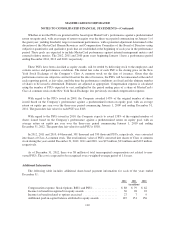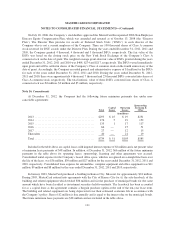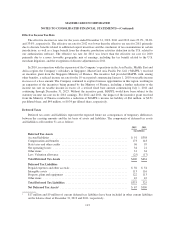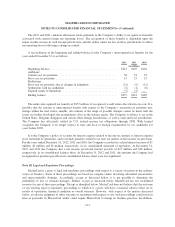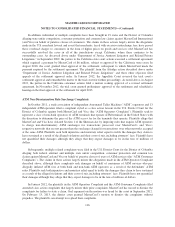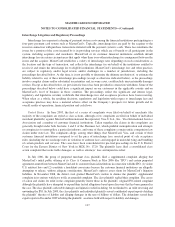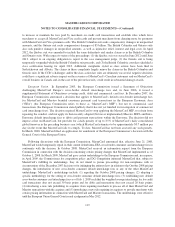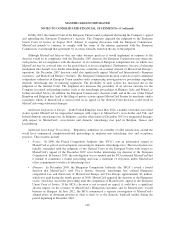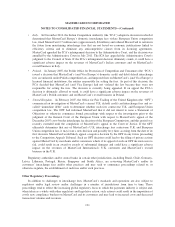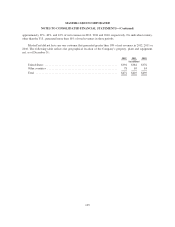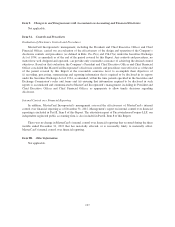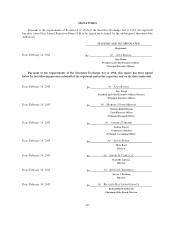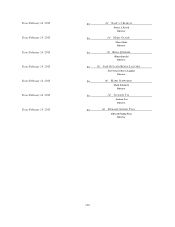MasterCard 2012 Annual Report Download - page 124
Download and view the complete annual report
Please find page 124 of the 2012 MasterCard annual report below. You can navigate through the pages in the report by either clicking on the pages listed below, or by using the keyword search tool below to find specific information within the annual report.MASTERCARD INCORPORATED
NOTES TO CONSOLIDATED FINANCIAL STATEMENTS—(Continued)
In May 2012, the General Court of the European Union issued a judgment dismissing the Company’s appeal
and upholding the European Commission’s decision. The Company appealed the judgment to the European
Union Court of Justice in August 2012. Subject to ongoing discussion with the European Commission,
MasterCard intends to continue to comply with the terms of the interim agreement with the European
Commission, even though that agreement, by its terms, formally ended on the day of the judgment.
Although MasterCard believes that any other business practices it would implement in response to the
decision would be in compliance with the December 2007 decision, the European Commission may deem any
such practice not in compliance with the decision, or in violation of European competition law, in which case
MasterCard may be assessed fines for the period that it is not in compliance. Furthermore, because a balancing
mechanism like default cross-border interchange fees constitutes an essential element of MasterCard Europe’s
operations, the December 2007 decision could also significantly impact MasterCard International’s European
customers’ and MasterCard Europe’s business. The European Commission decision could also lead to additional
competition authorities in European Union member states commencing investigations or proceedings regarding
domestic interchange fees or initiating regulation. The possibility of such actions has increased due to the
judgment of the General Court. The judgment also increases the possibility of an adverse outcome for the
Company in related and pending matters (such as the interchange proceedings in Hungary, Italy and Poland, as
further described below). In addition, the European Commission’s decision could, and in the case of the United
Kingdom and Belgium has, lead to the filing of private actions against MasterCard Europe by merchants and/or
consumers which, if MasterCard is unsuccessful in its appeal of the General Court decision, could result in
MasterCard owing substantial damages.
Additional Litigations in Europe. In the United Kingdom, since May 2012, a number of retailers have filed
claims against MasterCard for unspecified damages with respect to MasterCard’s cross-border and U.K. and
Ireland domestic interchange fees. In Belgium, a retailer filed claims in December 2012 for unspecified damages
with respect to MasterCard’s cross-border and domestic interchange fees paid in Belgium, Greece and
Luxembourg.
Additional Interchange Proceedings. Regulatory authorities in a number of other jurisdictions around the
world have commenced competition-related proceedings or inquiries into interchange fees and acceptance
practices. These matters include:
•France. In 2009, the French Competition Authority (the “FCA”) sent an information request to
MasterCard as part of an investigation concerning its domestic interchange rates. The investigation was
initially suspended until the judgment of the General Court of the European Union with respect to
MasterCard’s appeal of the December 2007 cross-border interchange fee decision of the European
Commission. In January 2013, the investigation was re-opened and the FCA informed MasterCard that
it intends to commence a formal proceeding and issue a statement of objections unless MasterCard
offers commitments to reduce its interchange fees.
•Hungary. In December 2009, the Hungarian Competition Authority (the “HCA”) issued a formal
decision that MasterCard’s (and Visa’s) historic domestic interchange fees violated Hungarian
competition law and fined each of MasterCard Europe and Visa Europe approximately $3 million,
which was paid during the fourth quarter of 2009. MasterCard appealed the decision to the Hungarian
courts, which has stayed the proceeding until the completion of MasterCard’s appeal to the European
Union Court of Justice. If the HCA’s decision is not reversed on appeal, it could have a significant
adverse impact on the revenues of MasterCard’s Hungarian customers and on MasterCard’s overall
business in Hungary. In June 2012, the HCA commenced a separate investigation of MasterCard’s
alleged abuse of dominant position in what it refers to as the domestic bankcard market during the
period beginning in December 2010.
120


